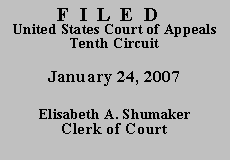

| UNITED STATES OF AMERICA,
v.
BRIAN F. DURST |
|
Defendant-Appellant Brian F. Durst, a federal inmate appearing pro se, seeks to appeal from the district court's dismissal of his motion to vacate, set aside, or correct his sentence pursuant to 28 U.S.C. § 2255, and its subsequent denial of his motion for reconsideration. Because Mr. Durst has failed to demonstrate that it is reasonably debatable whether the district court's procedural ruling dismissing his claim is correct or that the district court was within its discretion in denying the motion for reconsideration, see Slack v. McDaniel, 529 U.S. 473, 484 (2000), we deny a COA and dismiss the appeal.(*)
In December 2004, Mr. Durst pled guilty to possession of child pornography in violation of 18 U.S.C. § 2252A(a)(5)(B). He was sentenced to thirty-three months imprisonment followed by three years supervised release. Final judgment was entered on March 30, 2005. Mr. Durst did not appeal. On August 3, 2006, Mr. Durst filed his § 2255 motion.
The district court correctly determined that Mr. Durst's § 2255 motion was time-barred by the one-year limitation period contained therein. The judgment of conviction became final on April 13, 2005, ten days after the time for appeal had run. See Clay v. United States, 537 U.S. 522, 524 (2003); Fed. R. App. P. 4(b)(1)(A)(I) (notice of appeal must be filed within ten days after entry of judgment); 4(b)(6) (judgment is entered when entered on criminal docket); 26(a)(2) (excluding intermediate Saturdays, Sundays or legal holidays if the period is less than eleven days). Thus, Mr. Durst had until April 13, 2006, to file his § 2255 motion.
Mr. Durst filed his motion on August 3, 2006, or July 26, 2006, assuming he is entitled to the benefits of the prison mailbox rule. See Houston v. Lack, 487 U.S. 266, 270 (1988). Although the one-year limitation period on § 2255 motions is not jurisdictional, it is subject to equitable tolling only in extraordinary circumstances. See United States v. Willis, 202 F.3d 1279, 1281 n.3 (10th Cir. 2000). Because Mr. Durst did not argue for equitable tolling in his motion, the district court determined it was inappropriate to toll the statute.
In his motion for reconsideration, Mr. Durst argued that because he learned on July 19, 2006, that the statute he was convicted under was unconstitutional, the statute of limitations should have run from that point. This is plainly incorrect. See Marsh v. Soares, 223 F.3d 1217, 1220 (10th Cir. 2000) ("[I]gnorance of the law, even for an incarcerated pro se prisoner, generally does not excuse prompt filing.") (quoting Fisher v. Johnson, 174 F.3d 710, 714 (5th Cir. 1999)), cert. denied, 531 U.S. 1194 (2001).
In his two-page brief filed before this court, Mr. Durst similarly fails to make any argument to justify the late filing of his motion. We note that the substance of Mr. Durst's argumentthat the statute under which he was convicted is unconstitutionalrelies on two cases, both of which have been vacated by the Supreme Court, see United States v. Smith, 402 F.3d 1303 (11th Cir. 2005), vacated, 545 U.S. 1125 (2005); United States v. Maxwell, 386 F.3d 1042 (11th Cir. 2004), vacated, 126 S. Ct. 321 (2005), and neither of which is binding in this circuit. Accordingly, it is not reasonably debatable that the district court's dismissal of the claim was correct. Nor is it reasonably debatable that the district court was well within its discretion in denying the motion for reconsideration. See Price v. Philpot, 420 F.3d 1158, 1167 n.9 (10th Cir. 2005).
We DENY a COA and DISMISS. Mr. Durst's accompanying motion to be released on bail pending his appeal is DENIED.
Entered for the Court
Paul J. Kelly, Jr.
Circuit Judge
*. Mr. Durst's challenge to the order dismissing his § 2255 petition and his challenge to the subsequent order denying reconsideration both require a COA. See United States v. Pedraza, 466 F.3d 932, 933-34 (10th Cir. 2006) (citing United States v. Lambros, 404 F.3d 1034, 1036-37 (8th Cir. 2005), cert. denied, 545 U.S. 1135 (2005)).